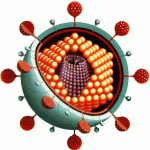Virology
|
21 april 2014 10:46:24 |
| Infection success of Echinoparyphium aconiatum (Trematoda) in its snail host under high temperature: role of host resistance (Parasites & Vectors) |
|
Tweet Background:
Extreme weather events such as summer heat waves become more frequent owing to global climate change and are predicted to alter disease dynamics. This is because high temperatures can reduce host immune function. Predicting the impact of climate change on host-parasite interactions is, however, difficult as temperature may also affect parasite infective stages and other host characteristics determining the outcome of interaction.
Methods:
Two experiments were conducted to investigate these phenomena in a Lymnaea stagnalis-Echinoparyphium aconiatum (Trematoda) interaction. In the first experiment, the effects of exposure of snails to experimental heat waves [maintenance at 25[degree sign]C vs. 15[degree sign]C (control)] with different durations (3 days, 7 days) on the infection success of parasite cercariae was examined. In the second experiment, the infection success was examined under similar conditions, while controlling for the possible temperature effects on cercariae and at least partly also for host physiological changes that take place rapidly compared to alterations in immune function (exposure to cercariae at intermediate 20[degree sign]C).
Results:
In the first experiment, increased infection success at 25[degree sign]C was found independently of the duration of the heat wave. In the second experiment, increased infection success was found only in snails maintained at 25[degree sign]C for 7 days, a treatment in which snail immune defence is known to be impaired.
Conclusions:
These results suggest that the effects of host resistance in determining overall parasite infection success can be overridden by effects of temperature on parasite transmission stages and/or alterations in other host traits than immune defence. |
| 115 viewsCategory: Epidemiology, Microbiology, Virology |
 Rickettsia bellii, Rickettsia amblyommii, and Laguna Negra hantavirus in an Indian reserve in the Brazilian Amazon (Parasites & Vectors) Rickettsia bellii, Rickettsia amblyommii, and Laguna Negra hantavirus in an Indian reserve in the Brazilian Amazon (Parasites & Vectors)Global transcriptional analysis reveals surface remodeling of Anaplasma marginale in the tick vector (Parasites & Vectors) 
|
| blog comments powered by Disqus |
MyJournals.org
The latest issues of all your favorite science journals on one page
The latest issues of all your favorite science journals on one page



